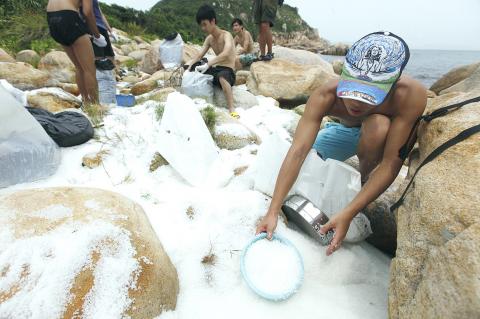The cleanup after Hong Kong’s worst typhoon in 13 years is taking longer than usual as volunteers struggle to collect hundreds of millions of plastic pellets that washed onto beaches after the containers they were in fell off a ship.
Environmental groups are concerned the pellets will absorb toxins and pollutants and then be eaten by fish that may in turn be eaten by humans. They’re also worried rare marine species could be threatened by the pollutants as they make their way up the food chain.
Several hundred volunteers at one beach on Sunday used trowels, paintbrushes, dustpans and sieves to painstakingly pick up the translucent pellets, which coated the shore.

Photo: Reuters
“It’s a bit overwhelming. It seems like we can’t get rid of them even though there are hundreds of people here,” said Mathis Antony, one of the volunteers helping to clean up a beach on Lamma Island, off the western coast of Hong Kong Island. “It looks like it’s going to take a lot more to clean it up.”
The volunteers took on the daunting task of sweeping up the tiny pellets scattered across the grassy, boulder-strewn shoreline. They filled dozens of garbage bags, but there was still a lot left by the end of the day, piled up like snow between rocks.
Also known as nurdles, the pellets are the raw materials used by factories to make plastic products. Authorities say six containers filled with the pellets were lost from a ship in waters south of Hong Kong when it was caught in Typhoon Vicente last month.
The storm prompted authorities to raise the typhoon warning system to its highest level, indicating hurricane-force winds of 118km an hour or more, for the first time since 1999. The government said large amounts of pellets have been found at 10 beaches. At some beaches, numerous sacks filled with pellets and bearing the markings of the manufacturer, China Petroleum and Chemical Corp, have also washed ashore.
About half of the 150 tonnes of pellets that the containers were carrying have been collected so far, the government said, including 50 tonnes from sacks carrying the pellets found at sea and another 21 tonnes washed ashore.

DITCH TACTICS: Kenyan officers were on their way to rescue Haitian police stuck in a ditch suspected to have been deliberately dug by Haitian gang members A Kenyan policeman deployed in Haiti has gone missing after violent gangs attacked a group of officers on a rescue mission, a UN-backed multinational security mission said in a statement yesterday. The Kenyan officers on Tuesday were on their way to rescue Haitian police stuck in a ditch “suspected to have been deliberately dug by gangs,” the statement said, adding that “specialized teams have been deployed” to search for the missing officer. Local media outlets in Haiti reported that the officer had been killed and videos of a lifeless man clothed in Kenyan uniform were shared on social media. Gang violence has left

US Vice President J.D. Vance on Friday accused Denmark of not having done enough to protect Greenland, when he visited the strategically placed and resource-rich Danish territory coveted by US President Donald Trump. Vance made his comment during a trip to the Pituffik Space Base in northwestern Greenland, a visit viewed by Copenhagen and Nuuk as a provocation. “Our message to Denmark is very simple: You have not done a good job by the people of Greenland,” Vance told a news conference. “You have under-invested in the people of Greenland, and you have under-invested in the security architecture of this

Japan unveiled a plan on Thursday to evacuate around 120,000 residents and tourists from its southern islets near Taiwan within six days in the event of an “emergency”. The plan was put together as “the security situation surrounding our nation grows severe” and with an “emergency” in mind, the government’s crisis management office said. Exactly what that emergency might be was left unspecified in the plan but it envisages the evacuation of around 120,000 people in five Japanese islets close to Taiwan. China claims Taiwan as part of its territory and has stepped up military pressure in recent years, including

UNREST: The authorities in Turkey arrested 13 Turkish journalists in five days, deported a BBC correspondent and on Thursday arrested a reporter from Sweden Waving flags and chanting slogans, many hundreds of thousands of anti-government demonstrators on Saturday rallied in Istanbul, Turkey, in defence of democracy after the arrest of Istanbul Mayor Ekrem Imamoglu which sparked Turkey’s worst street unrest in more than a decade. Under a cloudless blue sky, vast crowds gathered in Maltepe on the Asian side of Turkey’s biggest city on the eve of the Eid al-Fitr celebration which started yesterday, marking the end of Ramadan. Ozgur Ozel, chairman of the main opposition Republican People’s Party (CHP), which organized the rally, said there were 2.2 million people in the crowd, but